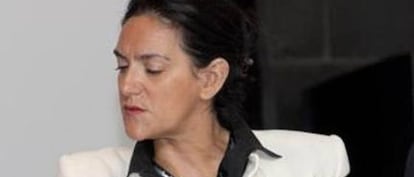Niece of shadowy ex-government fixer arrested on money-laundering charges
Beatriz García Paesa has been under investigation for her role in Francisco Paesa’s activities She is being held in relation to embezzlement from multi-million security equipment deal to Angola


Luxembourg’s police force has arrested the niece of Francisco Paesa, a convicted fraudster who once enjoyed high-level links with the Spanish Interior Ministry, and who is now believed to be in hiding in the duchy.
Beatriz García Paesa, 48, was arrested last Wednesday in Luxembourg, where she has been living for the last two decades, and is being held on charges of money laundering in relation to a multi-million euro contract to sell security equipment to Angola, according to judicial sources in the country, with whom EL PAÍS has spoken.
García’s arrest was carried out by the Luxembourger police at the request of the Spanish Civil Guard, which is running an operation to break up a business network that has embezzled millions of euros from a contract to supply the government of Angola with police equipment.
The Spanish Civil Guard is running an operation to break up a business network that has embezzled millions
A further nine people have been arrested along with García Paesa, most of them in Spain. Sources say the €152-million contract was being used as a screen to channel part of the money to different private accounts of members of the network, as well as some officials involved in the bidding process for the police equipment.
García’s law firm allegedly drew up the complex web of financial structures to launder the stolen money, sending it to tax havens such as Switzerland, Cayman Islands, Gibraltar, Hong Kong, Madeira and Luxembourg.
It was the Luxembourg authorities who, in 2013, alerted the Spanish authorities about the arrival there of large amounts of money from Spain. The High Court set up Operation Angora, suspecting García Paesa and her associates of conspiracy, money laundering, illegal international transactions and tax evasion.
García’s law firm allegedly drew up a complex web of financial structures to launder the stolen money
García is also under investigation in Luxembourg for business dealings in Angola, along with her alleged involvement in the theft of 10 million dollars from Russian magnate Alexandr Lebedev in 2012 by her uncle, Francisco Paesa.
Lebedev – who is a former KGB agent, banker, politician and the owner of British dailies The Independent and the Evening Standard, and who is worth around $2 billion – allegedly entrusted Paesa with some €20 million to set up a bank in Gulf state Bahrain, but half of the money has disappeared in a complex network of accounts and front companies, while no bank has yet been set up.
Francisco Paesa was imprisoned in the late 1970s for money laundering, but after his release from jail he began working for the Socialist Party government of Felipe González as a fixer. With funding from the Interior Ministry, he waged a dirty war against suspected ETA members in France during the 1980s.
Francisco Paesa waged a dirty war against suspected ETA members in France during the 1980s
He fled Spain, obtaining a diplomatic passport from Santo Tomé and took up residence in Switzerland. Former Spanish Judge Baltasar Garzón issued a warrant for his arrest, prompting the Swiss authorities to expel him. He gave himself up to the Spanish police and was questioned by a judge in 1991 but was not prosecuted due to lack of evidence.
Three years later, Luis Roldán was discovered to have been charging commissions to construction companies to build Civil Guard barracks. Knowing of his contacts and seeming immunity to justice, Roldán enlisted Paesa’s help in laundering the €10 million that he had accumulated, and then in helping him to flee to Laos.
Paesa then sold his services to the Spanish police, persuading Roldán to give himself up in Bangkok a year later. Media reports at the time said that he was paid more than €1 million for turning in Roldán.
In 2004, media reports had Paesa living in Luxembourg under a new identity with an Argentinean passport
Three years later, Paesa’s death notice was published in EL PAÍS. He was supposed to have died from a heart attack and been cremated in Thailand. The authenticity of the notice came into question when no family members attended the funeral Mass at a monastery near Burgos. Shortly before the death notice, around €5 million was removed from Paesa’s bank account.
In 2004, media reports had Paesa living in Luxembourg under a new identity, and with an Argentinean passport. Shortly after, a Spanish court ruled that under the statute of limitations he could no longer be pursued for the money-laundering charges.
In 2012, he surfaced again, this time after he was detained while trying to leave the West African state of Sierra Leone, accused of drug smuggling. His release was facilitated by the Spanish foreign ministry, despite being on Interpol’s most-wanted list for several years. There are no charges against him in Spain any longer.
His niece runs a law firm in Luxembourg. She has recently teamed up with Benjamin Bodig, a young local lawyer.
The Luxembourg authorities believe that she has been a close associate of her uncle over the years. She has written letters to organizations in Bahrain in support of her uncle. Four million euros of the money Lebedev says was stolen from him ended up in an account at the Overseas Union Bank of Singapore in the name of Kon Kim Kong. This is the same bank that Francisco Paesa used to hide the money stolen by the former head of the Civil Guard. Swiss judge Paul Perraudin has described Beatriz García and her brother Alfonso as “fronts for and collaborators of their uncle.”
In 2013, Beatriz García’s name came up in the scandal last year involving illegal eavesdropping by the country’s secret services on behalf of the former prime minister, Jean Claude Juncker.
Tu suscripción se está usando en otro dispositivo
¿Quieres añadir otro usuario a tu suscripción?
Si continúas leyendo en este dispositivo, no se podrá leer en el otro.
FlechaTu suscripción se está usando en otro dispositivo y solo puedes acceder a EL PAÍS desde un dispositivo a la vez.
Si quieres compartir tu cuenta, cambia tu suscripción a la modalidad Premium, así podrás añadir otro usuario. Cada uno accederá con su propia cuenta de email, lo que os permitirá personalizar vuestra experiencia en EL PAÍS.
¿Tienes una suscripción de empresa? Accede aquí para contratar más cuentas.
En el caso de no saber quién está usando tu cuenta, te recomendamos cambiar tu contraseña aquí.
Si decides continuar compartiendo tu cuenta, este mensaje se mostrará en tu dispositivo y en el de la otra persona que está usando tu cuenta de forma indefinida, afectando a tu experiencia de lectura. Puedes consultar aquí los términos y condiciones de la suscripción digital.








































